Mom Gets In A Debate With Her Co-Workers After They Questioned The Silly Names Her Children Gave Their Family Pets
Children are fascinating when you talk to them. They don't filter their thoughts yet and express the most ridiculous things they know without a second thought.
They are honestly so hilarious and creative when their imaginations are allowed to run free. With her guidance, a mom gave her kids full creative control over the names of their family pets.
They have two guinea pigs, one hamster, and a dog. As you can imagine, the children took this task rather seriously.
The dog was given the name Fondue, named after a fictional My Hero Academia dog that OP's daughter read about.
Their fuzzy white hamster was named King Boo, taken from the famous King Boo of Super Mario.
OP had the honor of naming one of the guinea pigs and called it Sister. The last guinea pig has the wildest name of all, thanks to OP's son.
Her name is King of Bagels Snomson, the Third King of Slayer of Gods the 17th. Her friends call her Snom.
OP doesn't know where her son pulled the name from, but it is definitely memorable. Their names are too good to be kept within the family, so OP's co-workers got to know the animals when they visited for a get-together.
They commented that the animals' names are odd

OP said the animals do not really know or care what their names are
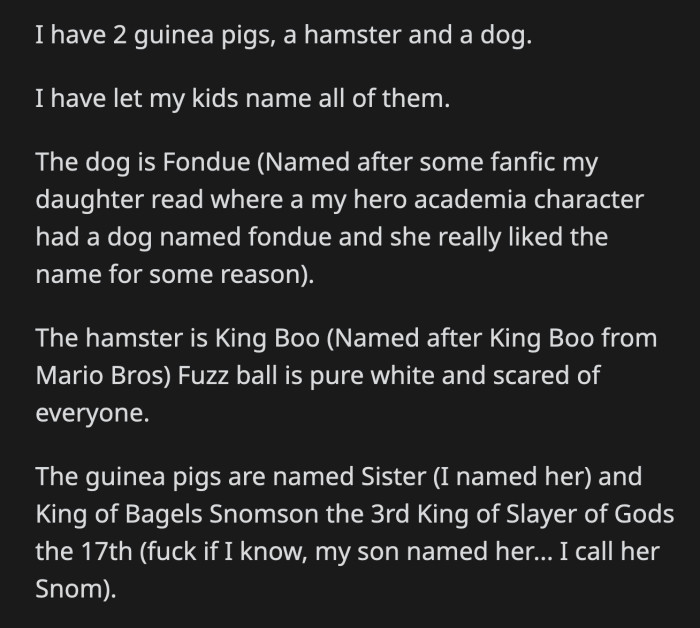
The adults were divided on whether kids should be allowed to name pets, and one of them pointed out that pets should have proper names. OP doesn't think there is anything wrong with what her kids chose for their family pets.
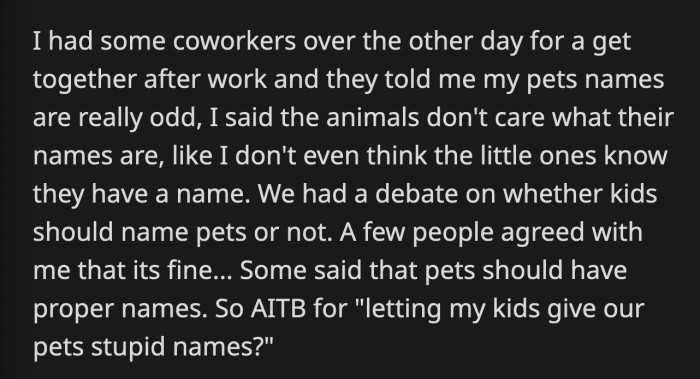
Understanding Parental Choices in Naming
Dr. Rebecca Hughes, a developmental psychologist, emphasizes that children's names can carry significant emotional weight for parents and can reflect their values and beliefs.
Her research indicates that unique or unconventional names can serve as a form of self-expression and identity for families.
Moreover, studies show that the naming process can reflect familial heritage and cultural significance.
The Psychology of Naming and Identity
Dr. Emily Carter, a developmental psychologist at the University of Michigan, emphasizes that names can significantly influence a child's self-concept and identity.
Her studies reveal that unique or unconventional names, like those given to pets, can foster creativity and individuality in children.
This process of naming can also reflect family dynamics, where humor and affection play key roles in the parent-child relationship.
Kneel Before Me So I Can Knight Thee and Freddie Mercury Not Kruger are some of the best pet names I've heard!
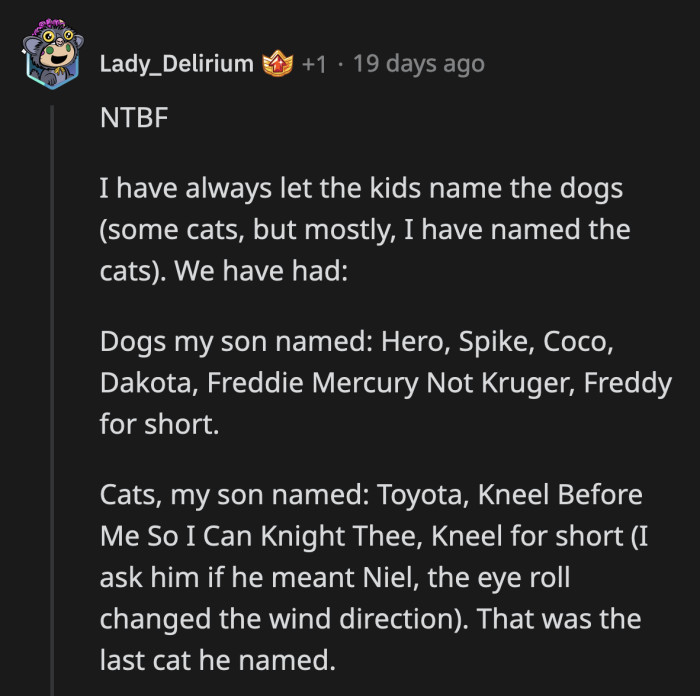
OP's colleagues are missing out because names like these are incredibly fun
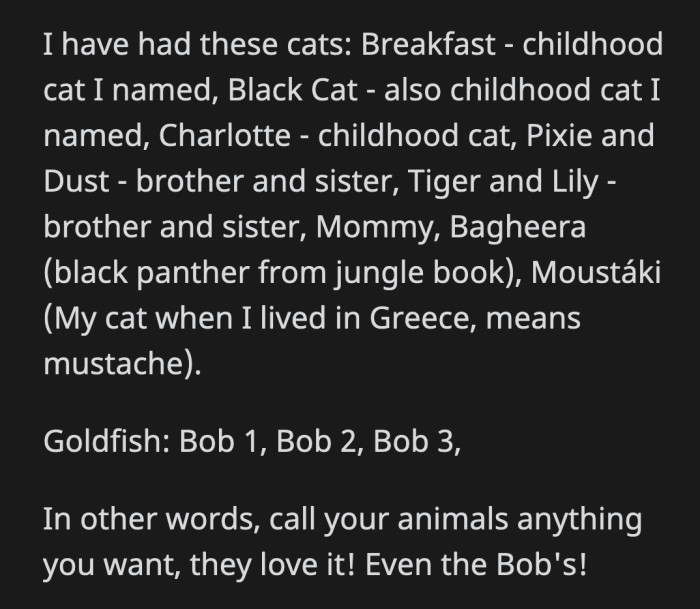
OP's kids are going places because these names are so, so creative

From a social psychology perspective, the reactions to children's names can reveal societal norms and expectations around naming conventions.
Research suggests that names often carry implicit biases, which can influence perceptions of individuals from a young age.
This can lead to challenges for children with unconventional names, as they may face prejudice or misunderstanding based on their names alone.
Social psychologists have long noted that humor can serve as a powerful bonding tool within groups.
In this case, the debate among co-workers highlights how shared laughter and playful teasing can enhance social cohesion, but can also lead to misunderstandings when humor is not universally appreciated.
Research indicates that humor used in family settings often reflects deeper emotional connections, reinforcing the importance of supportive environments for personal expression.
OP was correct; the pets don't even know that they have names. As long as they get everything they need, they will happily answer to any name.
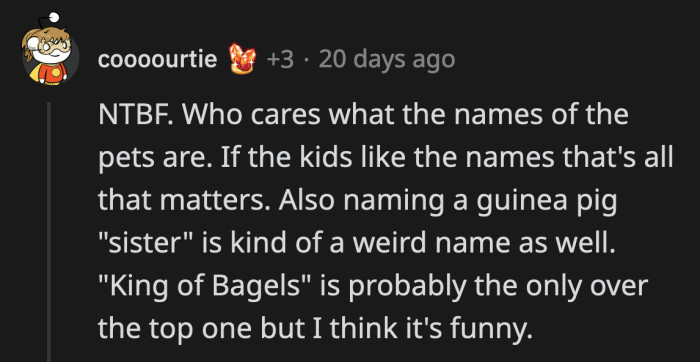
Plus, this odd pet naming phenomenon is not exclusive to children. Adults call their pets all sorts of names, too.
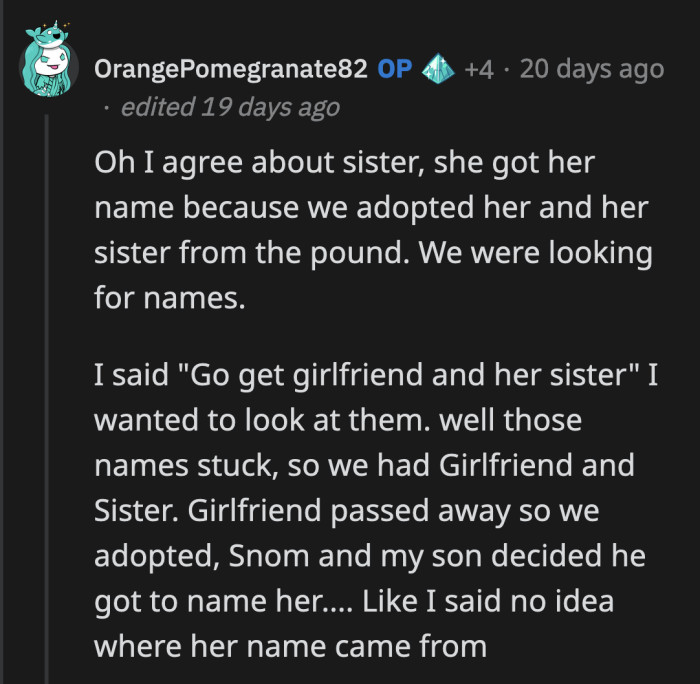
Maybe Snom the guinea pig is the ruler of all the guinea pigs in their land. We don't know their backstory!
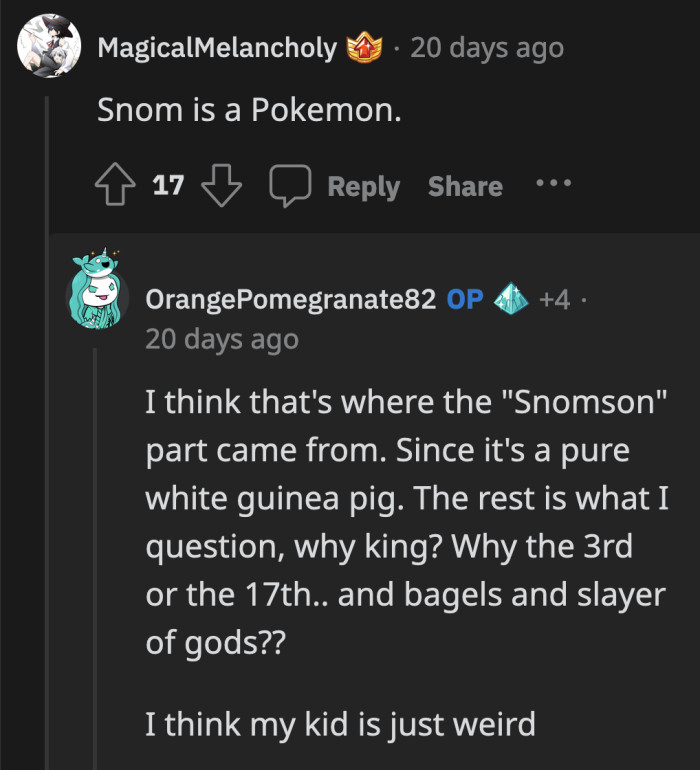
Encouraging Acceptance of Unique Names
Experts recommend fostering a culture of acceptance around diverse naming practices to promote inclusivity.
Encouraging discussions about the significance of names can help demystify unconventional choices and promote understanding.
Moreover, raising awareness about the impact of biases related to names can help minimize prejudice and foster a more inclusive environment.
Coping with Criticism
When faced with criticism, especially regarding something as personal as naming choices, individuals may experience cognitive dissonance, which can trigger defensiveness.
Psychologists argue that this reaction is a natural response to perceived threats against one’s identity and values.
To manage these feelings, it’s essential to develop strategies such as open communication, where parents can explain the significance behind their choices, fostering understanding rather than conflict.
OP's children do not deserve the scrutiny they're receiving over the silly names they came up with for their pets
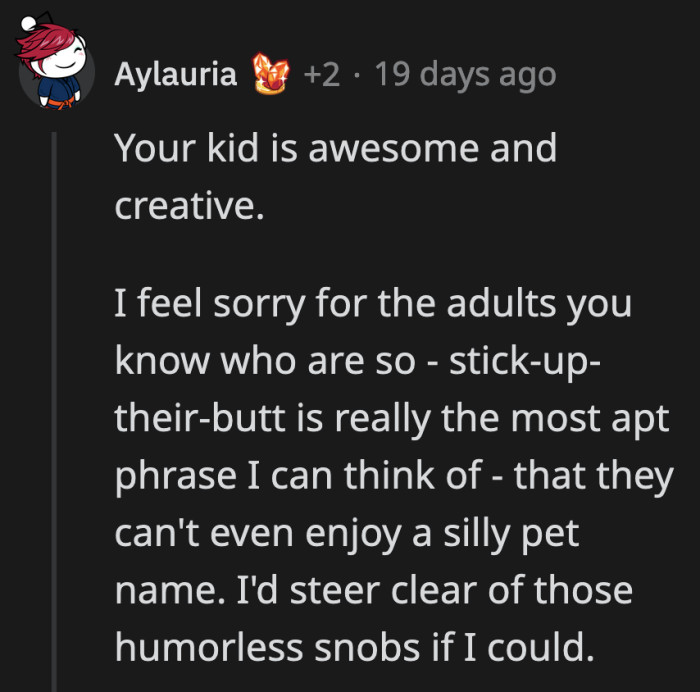
They will have a million other nicknames on top of their actual names anyway. It's really not that big of a deal.
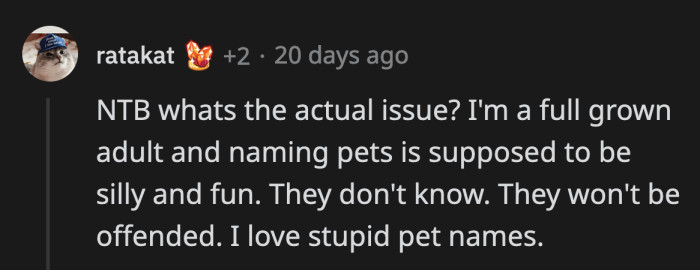
Giving family pets a person’s name is also funny. Would OP's co-workers appreciate it better if one of the pets was named John Williamson V?

According to Dr. Adam Grant, an organizational psychologist, "Engaging in open discussions about differing opinions fosters a culture of understanding and respect." By encouraging her co-workers to share their perspectives and actively listening, the mother can create a more inclusive atmosphere that values diversity in naming and personal choices. This approach not only promotes empathy but also teaches children valuable conflict-resolution skills, as noted by Dr. Dan Siegel, who states, "Teaching kids to navigate disagreements is essential for their emotional development."
It's not like OP's kids named their pets anything vulgar. They were just having fun.
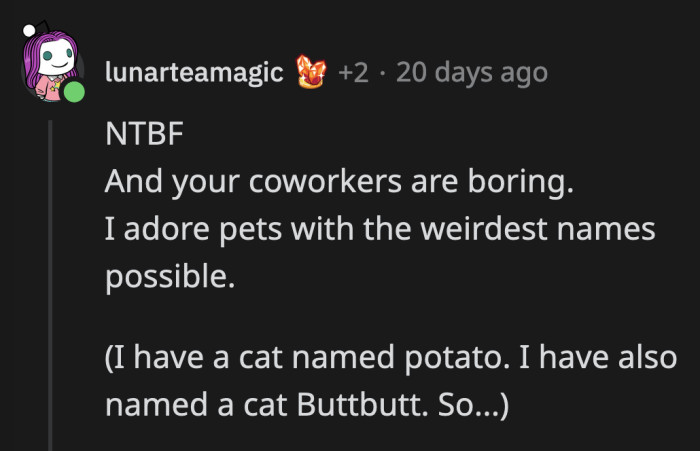
Is a dog named Oreo or Hotdog any better than a dog named Fondue?

They seriously clutched their pearls over something as silly as kids giving their pets adorably creative names
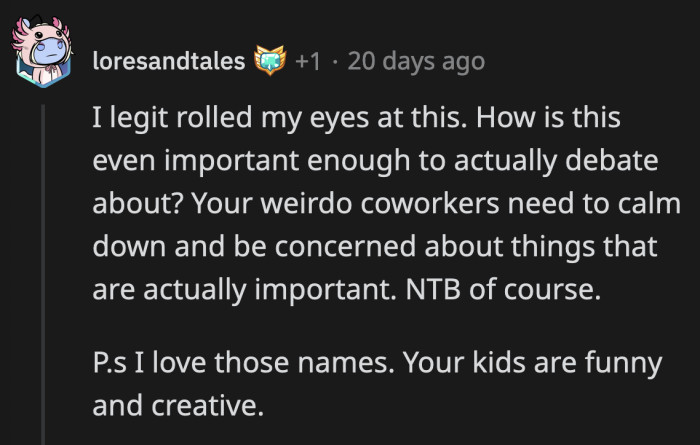
The Role of Humor in Family Dynamics
Family humor, particularly involving pets, can act as a stress relief mechanism, helping to navigate daily challenges and emotional complexities.
A study published in the Journal of Family Psychology indicates that families who engage in playful banter often cope better with stressors, as humor fosters resilience.
Thus, the mother's playful approach to naming pets can be viewed as a form of emotional support that strengthens family bonds.
OP has nothing to worry about. From the looks of it, she is an incredible parent with amazingly creative children.
They will never have a boring day in their home. OP doesn't need to worry about what her colleagues think; she has a happy home filled with happy children and their weirdly named pets.
Psychological Analysis
This situation illustrates how humor can serve as both a bonding mechanism and a source of conflict within social groups.
Understanding the emotional significance of these names can help coworkers appreciate the mother's perspective, promoting empathy and reducing judgment.
Analysis generated by AI
Analysis & Alternative Approaches
Ultimately, naming choices and family humor reflect broader psychological themes of identity, creativity, and the importance of supportive interactions.
As families navigate differing opinions, fostering an environment of open dialogue and understanding can lead to stronger connections and enhanced emotional well-being.
Psychological Analysis
This scenario illustrates the complexities surrounding naming choices and societal perceptions.
Encouraging acceptance of diverse names can help foster a sense of belonging and identity for children.
Analysis generated by AI
Analysis & Alternative Approaches
Ultimately, understanding the emotional significance of names is crucial for fostering acceptance and inclusivity.
Research indicates that supporting diverse naming practices can enhance children's self-esteem and sense of identity.
By promoting a culture of understanding, families can contribute to a more inclusive society.



